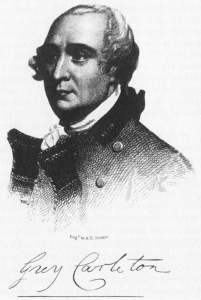From Diary of the American Revolution, Vol I. Compiled by Frank Moore and published in 1859.

July 1. –The movements of the American army in the north, since the commencement of the war, have been, with one or two exceptions, but a series of disgraceful defeats, or more disgraceful retreats. The only satisfaction those who have been taken have enjoyed, is the kind treatment of General Carleton, who has lately been deprived of his commission for his kindness to rebels; while the reward of those of us who have managed to escape, has been the hardest of poor fare, and a continual suffering, the usual attendant upon bad generalship and still worse internal mismanagement. * * * * We are now at Ticonderoga, and to-day General Burgoyne, whose army has been hovering around us and in sight for the few days past, has put forth a pompous proclamation,1 which is probably intended to frighten us into desertion or a surrender.2 It is as follows:
By John Burgoyne, Esq., Lieutenant-General of his Majesty’s armies in America, Colonel of the Queen’s regiment of light dragoons, Governor of Fort William, in North Britain, one of the Representatives of the Commons of Great Britain in Parliament, and commanding an army and fleet employed on an expedition from Canada, &c., &c., &c,
The forces entrusted to my command are designed to act in concert, and upon a common principle, with the numerous armies and fleets which already display in every quarter of America, the power, the justice, and, when properly sought, the mercy of the King.
The cause in which the British arms are thus exerted, applies to the most affecting interests of the human heart; and the military servants of the crown, at first called forth for the sole purpose of restoring the rights of the constitution, now combine with love of their country, and duty to their sovereign, the other extensive incitements which spring from a due sense of the general privileges of mankind. To the eyes and ears of the temperate part of the public, and to the breasts of suffering thousands in the provinces, be the melancholy appeal, whether the present unnatural rebellion has not been made a foundation for the completest system of tyranny that ever God, in his displeasure, suffered for a time to be exercised over a froward and stubborn generation.
Arbitrary imprisonment, confiscation of property, persecution and torture, unprecedented in the inquisitions of the Romish church, are among the palpable enormities that verify the affirmative. These are inflicted by assemblies and committees, who dare to profess themselves friends to liberty, upon the most quiet subjects, without distinction of age or sex, for the sole crime, often for the sole suspicion, of having adhered in principle to the government under which they were born, and to which, by every tie, divine and human, they owe allegiance. To consummate these shocking proceedings, the profanation of religion is added to the most profligate prostitution of common reason; the consciences of men are set at naught; and multitudes are compelled not only to bear arms, but also to swear subjection to an usurpation they abhor.
Animated by these considerations; at the head of troops in the full powers of health, discipline, and valor; determined to strike where necessary, and anxious to spare where possible, I, by these presents, invite and exhort all persons, in all places where the progress of this army may point, and by the blessing of God I will extend it far, to maintain such a conduct as may justify me in protecting their lands, habitations, and families.
The intention of this address is to hold forth security, not depredation to the country. To those whom spirit and principle may induce to partake of the glorious task of redeeming their countrymen from dungeons, and re-establishing the blessings of legal government, I offer encouragement and employment; and upon the first intelligence of their associations, I will find means to assist their undertakings. The domestic, the industrious, the infirm, and even the timid inhabitants, I am desirous to protect, provided they remain quietly at their houses; that they do not suffer their cattle to be removed, nor their corn or forage to be secreted or destroyed; that they do not break up their bridges or roads; nor by any other act, directly or indirectly, endeavor to obstruct the operations of the King’s troops, or supply or assist those of the enemy. Every species of provision brought to my camp, will be paid for at an equitable rate, and in solid coin.
In consciousness of Christianity, my royal master’s clemency, and the honor of soldiership, I have dwelt upon this invitation, and wished for more persuasive terms to give it impression; and let not people be led to disregard it, by considering their distance from the immediate situation of my camp. I have but to give stretch to the Indian forces under my direction, and they amount to thousands, to overtake the hardened enemies of Great Britain and America; I consider them the same wherever they may lurk.
If, notwithstanding these endeavors, and sincere inclinations to effect them, the frenzy of hostility should remain, I trust I shall stand acquitted in the eyes of God and men in denouncing and executing the vengeance of the State against the wilful outcasts. The messengers of justice and of wrath await them in the field; and devastation, famine, and every concomitant horror that a reluctant but indispensable prosecution of military duty must occasion, will bar the way to their return.3
1 Issued at Bouquet Ferry Camp, June 20, 1777.
2 Extract of a letter from John Hawk to his wife, dated Ticonderoga, July 1, 1777.
3 Pennsylvania Evening Post, August 21.
